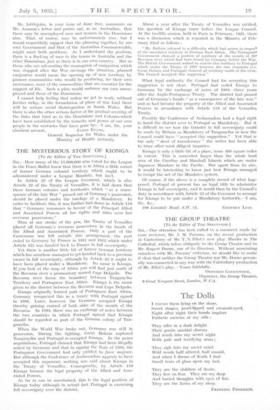THE MYSTERIOUS STORY OF KIONGA
[To the Editor of THE SPECTATOR.] Sin,—How many of the 11,000,000 who voted for the League in the Peace Ballot know that there is in Africa a little corner of former German colonial territory which ought to be administered under a League Mandate, but isn't.
In Article 22 of the League Covenant, which is also Article 22 of the Treaty of Versailles, it is laid down that those German colonies and territories which " as a conse- quence of the late War " passed out of Germany's possession, should be placed under the tutelage of a Mandatory. In order to facilitate this, it was further laid down in Article 119 that " Germany renounces in favour of the Principal Allied and Associated Powers all her rights and titles over her overseas possessions."
Thus at one stroke of the pen, the Treaty of Versailles placed all Germany's overseas possessions in the hands of the Allied and Associated Powers. Only a part of the Cameroons was left outside this arrangement—the part ceded to Germany by France in 1911 and 1912 which under Article 125 was handed back to France in full sovereignty.
Yet there is another little bit of forMer German territory which has somehow managed to get handed back to a previous owner in full sovereignty, although by Article 22 it ought to have been .placed under a Mandatory. Its name is Kionga. If you look at the map of Africa you will find just south of the Rovuma river a promontory named ,Cape Delgado. The Rovuma river forms the boundary between Tanganyika Territory and Portuguese East Africa. Kionga is the name given to the district between the Rovuma and Cape Delgado.
Kionga originally formed part of Portuguese East Africa. Germany recognized this in a treaty with Portugal signed in 1886. Later, however, the Germans occupied Kionga thereby gaining control of bath sides of the mouth of the Rovuma. In 1894, there was an exchange of notes betWeen the two countries in which Portugal agreed that Kionga should be regarded as part of the German colony of Tan- ganyika. • When the World War broke out, Germany was still in
possession. During the fighting, Great Britain captured Tanganyika and Portugal re-occupied Kionga. In the peace negotiations, Portugal claimed that. Kionga had been illegally seized by Germany and that in signing the Note of 1894, the Portuguese Government had only yielded to force majeure. But although the Conference of Ambassadors appears to have accepted this argument, nothing was said about Kionga in the Treaty of Versailles.. Consequently, by Article 119 Kionga became the legal property of the Allied and Asso- ciated Powers.
As far as can be ascertained, this is the legal position of Kionga today although in actual fact Portugal is exercising full sovereignty over the district. About a year after the Treaty of Versailles was ratified, the question of Kionga came before the League Council. At the twelfth session, held in Paris in February, 1921, there was a discussion which is reported in the Minutes of Feb- ruary 22nd as follows :
" Mr. Balfour referred to a difficulty which had arisen in respect of the mandated territory in German East Africa. Tho Portuguese Government claimed a portion of territory at the mouth of the Rovuma river which had been seized by Germany before the War. The British Government wished to restore this territory to Portugal which under the Treaty of 1891 between the two countries (..e. Great Britain and Portugal) claimed all territory south of the river. The Council accepted this suggestion."
What legal authority the Council had for accepting this suggestion is not clear. Portugal had ceded Kionga to Germany by the exchange of notes of 1894—three years after the Anglo-Portuguese Treaty. The district had passed out of Germany's hands " as a consequence of the late war," and so had become the'property of the Allied and Associated Powers in accordance with Article 119 of the Versailles Treaty.
Possibly the Conference of Ambassadors had a legal right to hand the district over to Portugal as Mandatory. But it is difficult to see how the transfer in full sovereignty could be made by Britain as Mandatory of Tanganyika or how the Council could have " accepted this suggestion." Yet that is the only " deed of transference " the writer has been able to trace after most diligent inquiries.
Kionga is.only a little bit of a place, some 400 square miles in extent. This is somewhat larger than the whole land area of the Caroline and Marshall Islands which are under Japanese Mandate in the Pacific. But apart from its size, it would be interesting to know just how Kionga managed to escape the net of the Mandates system.
Of course, if the above 'is a complete record of what hap- pened, Portugal at present has no legal title to administer Kionga in full sovereignty, and it would then be the Couneil's duty in accordance with Article 22 of the Covenant to arrang6 for Kionga to be put under a Mandatory forthwith.—I am; Sir, &c.,
109 Lonsdale Road, S.W. 13. GODFREY LIAS.














































 Previous page
Previous page